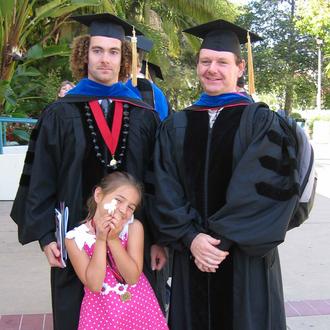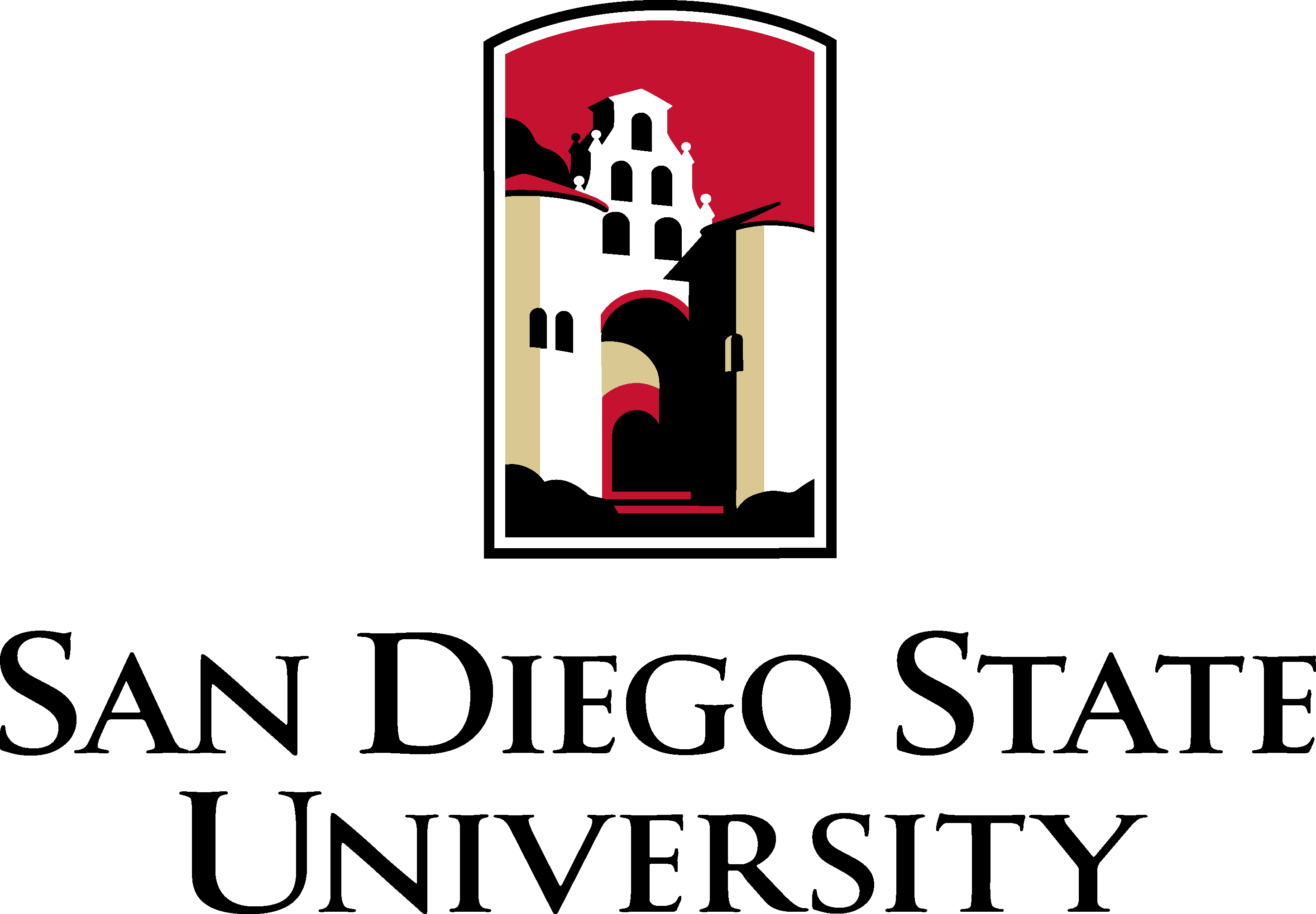
The Department of Chemistry and Biochemistry at SDSU offers the following degrees:
- Bachelor of Arts (B.A.)
- Bachelor of Science (B.S.)
- Bachelor of Science (B.S.) with Emphasis in Biochemistry
- Bachelor of Science (B.S.) in Chemical Physics
- Master of Arts (M.A.) (see also Earning the M.S.)
- Master of Science (M.S.) (see also Earning the M.A.)
- Doctor of Philosophy (Ph.D.)
(Joint Doctoral Program with UCSD)
Graduate Programs in Chemistry & Biochemistry
SDSU offers graduate study in M.A., M.S., and Ph.D. degrees across analytical, inorganic, physical, computational, chemistry education, organic, and biochemistry. Our program combines broad research opportunities with close mentorship and community. We are a Hispanic-Serving Institution, First-Gen Forward Institution, and AANAPISI, and we welcome and support students from diverse backgrounds.
The UCSD-SDSU Joint Doctoral Program (Ph.D.)
The Ph.D. in Chemistry is offered through the UCSD-SDSU Joint Doctoral Program (JDP). Students take graduate-level courses at UC San Diego during their first year of study and complete orientation exams upon entry. Doctoral research is conducted under the mentorship of an SDSU faculty advisor on the SDSU campus, with the opportunity to collaborate closely with UCSD faculty and benefit from resources at both campuses. Students advance to candidacy after completing coursework, passing written and oral examinations, and preparing a dissertation research proposal. The Ph.D. degree is jointly awarded by UCSD and SDSU, and dissertations are defended before a committee that includes faculty from both institutions. Most Ph.D. students are supported by teaching assistantships during their initial semesters and may transition to research assistantships once they join a funded research group.
This structure enables students to benefit from the strengths of both universities, providing exceptional preparation for industrial, academic, governmental, and other careers in chemistry and biochemistry.
Master of Science (M.S.)
The M.S. program at SDSU combines coursework with significant research experience. Students complete 30 units of graduate credit and conduct original research culminating in a written thesis and oral defense. Orientation exams are administered at the start of the program to help identify any areas where further coursework may be needed.
M.S. students work closely with faculty mentors and gain hands-on training in modern chemical research methods, with many presenting their work at local or national conferences. The program provides strong preparation for careers in biotechnology, pharmaceuticals, and chemistry-related industries, particularly in Southern California, as well as for those considering subsequent doctoral study.
Master of Arts (M.A.)
The M.A. program requires 30 units of graduate coursework, at least 24 of which must be in chemistry. Students take orientation exams upon entry; any deficiencies identified must be addressed through additional coursework. Students must also demonstrate competency in four of the five general areas of chemistry through exams or coursework.
The program culminates in either a comprehensive written examination or a faculty-approved research paper. The M.A. is well-suited to students who are not seeking extensive research training, including professionals employed in local industries. To accommodate working students, graduate courses are offered in the evening whenever possible.
How to Apply
Application opens: October 1, 2025
Applications will be accepted only for Fall 2026 admission (no spring starts).
Deadlines
See “Application Process” below for details about each step.
- Ph.D. / JDP deadlines:
- Step 1 — complete Cal State Apply: December 1, 2025
- Step 2 — submit transcripts & English proficiency (if applicable): December 8, 2025 (must be received by December 15)
- Step 3 — complete the Program Online Application via Slate SDSU: December 10, 2025
- Step 4 — complete UCSD component via Connect: December 10, 2025
- M.S. / M.A. deadlines:
- Step 1 — complete Cal State Apply: February 1, 2026
- Step 2 — submit transcripts & English proficiency (if applicable): February 8, 2026 (must be received by February 15)
- Step 3 — complete Slate: February 10, 2026
Application Process
Applicants must complete all steps by the deadlines given above for the corresponding degree program:
- Complete the University Online Application via Cal State Apply by the deadline for step 1 given above.
- All applicants must fill out the application on Cal State Apply and pay the required fee.
- Within two weeks of submitting your Cal State Apply application, you will receive an email from San Diego State University that includes your SDSUid. Your SDSUid is an identifier to securely access many campus IT services, including my.SDSU, the official online portal for student admissions, student records, financial aid, tuition and fee payment, and more. Create your my.SDSU account promptly upon receipt of this email and use it to check on the status of your application and to see a to-do list for action items that may still be required to complete all application steps.
- Send official transcripts and (for international students) proof of English proficiency to Graduate Admissions within one week of completing Cal State Apply (step 1 above).
- Send official transcripts from all colleges and universities attended to
Graduate Admissions either (a) electronically by following these instructions or (b) by mail to:
Graduate Admissions San Diego State University 5500 Campanile Drive San Diego, CA 92182-8225
- International applicants should review and complete the steps at SDSU Admissions, noting the requirements for proof of English language proficiency.
- The GRE is not required for applications to our graduate degree programs.
- Complete the SDSU Program Online Application via Slate. Within 72 hours of submitting your initial application to Cal State Apply, you will receive an email with a personalized link to Slate to submit your SDSU program application.
- JDP only: Complete the USCD component of the application at https://connect.grad.ucsd.edu/apply/. Select “Chemistry (JDP)” as your Program of Interest. This step can be done concurrently with Step 3.
Required Materials in Slate
- Statement of Purpose / Research Statement (1-2 pages, PDF) — see guidelines below
- Resume / CV
- Unofficial transcripts from all institutions attended
- Optional: publications, abstracts, or posters
- Recommender contact information
- Any supplemental departmental forms, if requested
Admitted students must provide official transcripts per Graduate Division policy.
Letters of Recommendation
- Three (3) required; a fourth optional. At least one should be from a research mentor (faculty or supervisor).
- Letters must be on letterhead and signed (digital acceptable).
- Recommenders should discuss intellectual ability, research skills, research outcomes or other indicators of success, professional qualities, motivation, and (if applicable) resilience.
- Research mentors are encouraged to comment on contributions to publications/presentations, independence, ethical conduct, and areas for growth.
Statement of Purpose / Research Statement
Submit a 1-2 page (≤ 1,000 words) PDF addressing:
- Motivation — your interest in chemistry and graduate study
- Research Experience — projects (goals, your role, techniques, outcomes, lessons learned)
- Research Interests & Fit — areas you wish to pursue, SDSU faculty of interest, and why
- Professional Goals — near- and long-term objectives and how a Ph.D. from SDSU/UCSD or our M.S./M.A. program will support you
- Personal Qualities — optional discussion of challenges, resilience, teamwork, or mentoring
- Conclusion — summarize your fit and enthusiasm for doctoral study at SDSU
Use specific examples and quantify when possible. Avoid generic statements. Proofread and seek feedback before submission.
Financial Support
Most admitted Ph.D. students receive teaching or research assistantships. M.S. students may be considered for assistantships depending on funding. See the SDSU Graduate Catalog for details.
Contact & Questions
- General inquiries: cheminfo@sdsu.edu or 619-594-5595
- Ph.D. (JDP): Prof. Byron Purse — bpurse@sdsu.edu
- M.S. / M.A.: Prof. Christal Sohl — chem.ms-advisor@sdsu.edu
